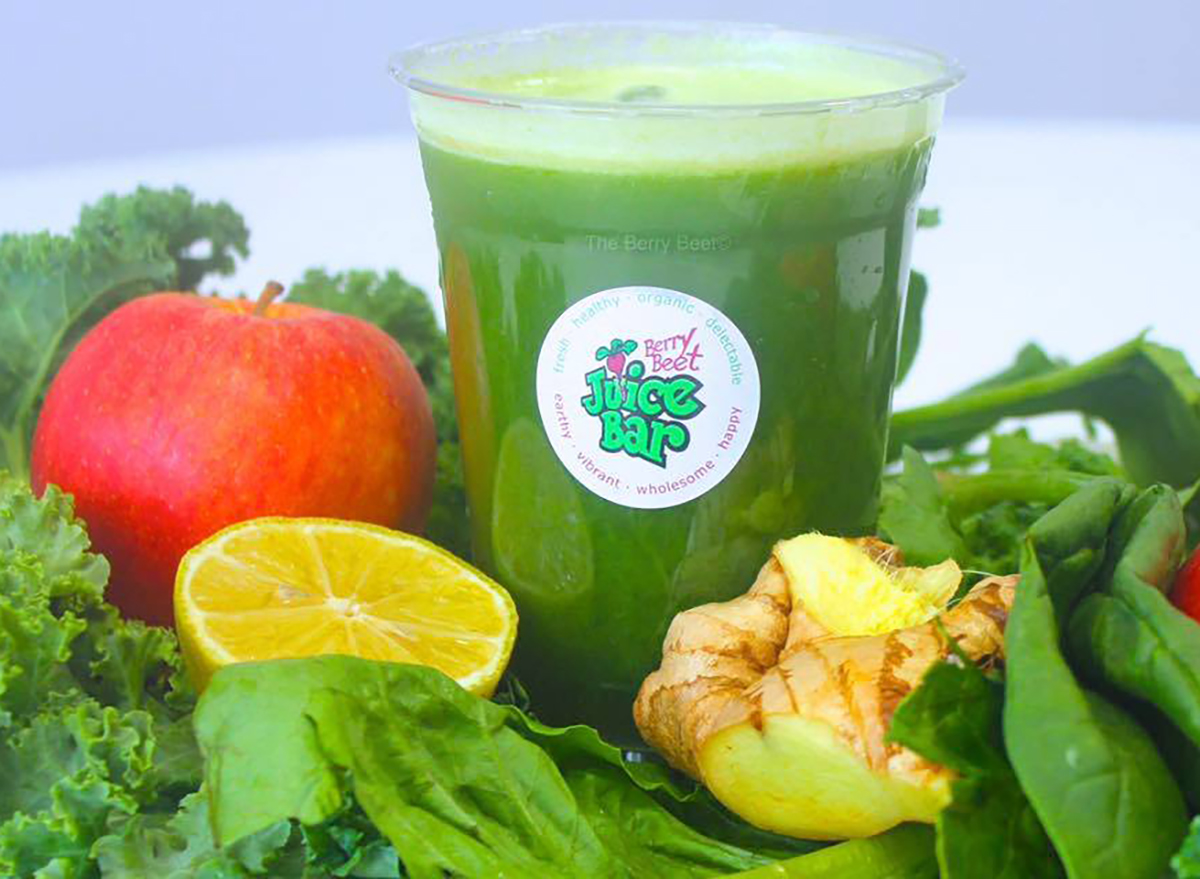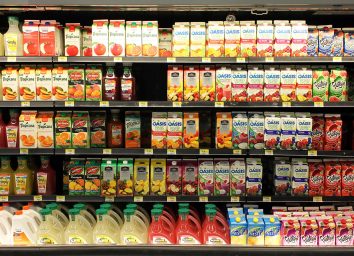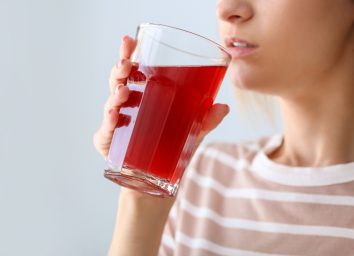5 Best Juices To Slow Aging, Says Science
Juice can be a delicious and refreshing way to pack in certain nutrients your body needs that you may not get on a daily basis through your food. And not only does it taste great, but it’s a quick and easy way to take these nutrients on the go during your busiest days. Among the many benefits of drinking this beverage, there are actually certain types of juice that may even help slow the aging process.
First, there’s an important distinction to understand between types of juice. There are many store-bought juices or fruit drinks that are essentially just fruit concentrate and added sugar. On the other hand, some juices out there are 100% natural and contain no added sugar or preservatives. These all-natural juices are the varieties you want to look for when it comes to healthy aging, especially because sugar-sweetened beverages—like those store-bought fruit drinks posing as juice—are associated with a greater risk of obesity, heart disease, type 2 diabetes, liver disease, and kidney disease.
Juices that are genuinely all-natural, 100% fruit or vegetables offer their own unique makeup of health benefits, but we’ve gathered a list of the types that have specific age-healthy antioxidants, vitamins, and minerals. Continue reading to learn more about how these drinks can help improve your aging process, and for more ways to help you eat healthy while retaining your youthful vibrance, don’t miss The 4-Step Breakfast Routine That May Help Protect Your Brain as You Age.
Pomegranate juice
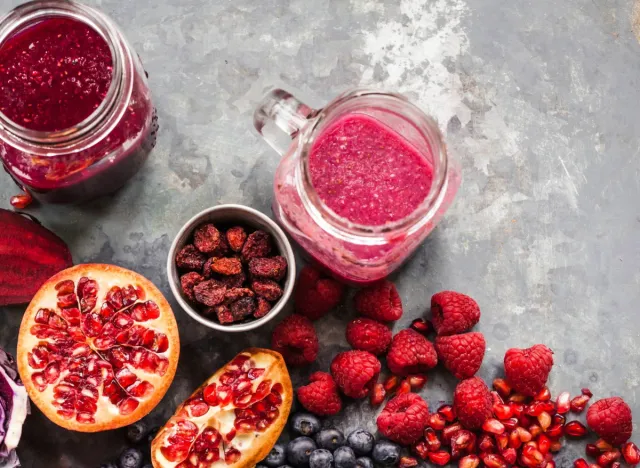
Pomegranates are teeming with antioxidants, like polyphenols, that can help reduce inflammation, fight cancer, and lower blood pressure levels. On top of these benefits, pomegranates have also been known to have a unique effect on your body’s aging cells.
After the age of 50, your cells begin to struggle with the recycling of mitochondria, which directly impacts the strength of your muscles. Not only that, but if your body is unable to recycle mitochondria quickly enough, they may build up and increase your risk of serious diseases like Parkinson’s.
The good news is that pomegranates contain a molecule that your gut microbiome converts to something called urolithin A, a compound that can help keep your mitochondrial process healthy. However, it’s important to note that some individuals may have gut flora that is not able to convert this compound, meaning that pomegranate juice wouldn’t have much of an effect.
Carrot juice
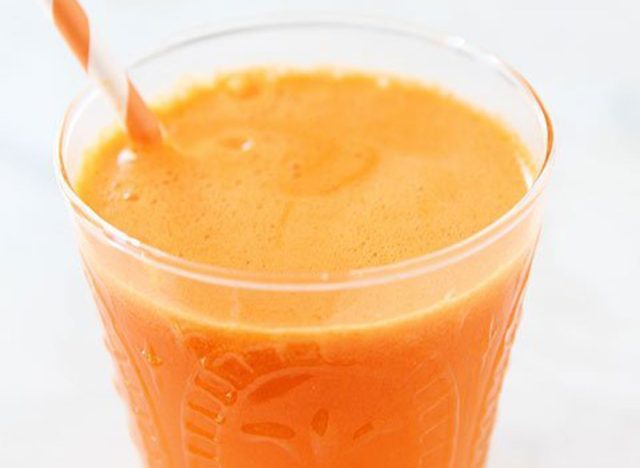
Carrots contain numerous antioxidants that can improve your health as you age. For instance, carrots are rich in lutein, which is known to help improve eye and brain health. This orange produce is also rich in another antioxidant called beta carotene, which is an antioxidant that your body can use to turn into vitamin A.
But, beta carotene‘s potential health benefits don’t stop there, as one study published in Cancer Epidemiology, Biomarkers & Prevention found that it may have the ability to help reduce the risk of prostate cancer in younger men.
Beet juice
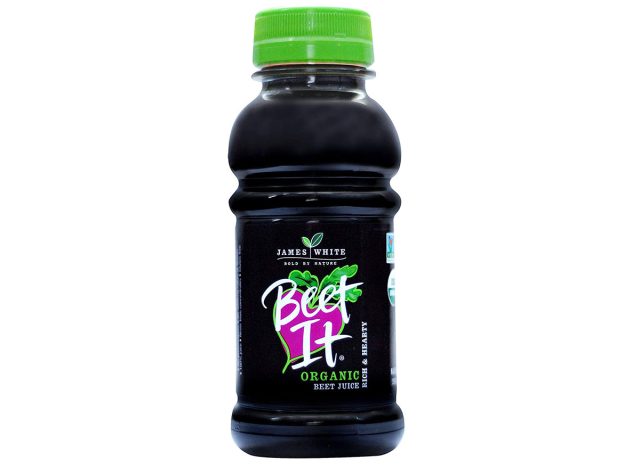
Whether you love it or hate it, beetroot juice is an undeniably powerful drink for helping to slow the aging process. A study from Redox Biology found that those who drank beet juice had more prominent levels of a specific type of bacteria that helps with cognitive and vascular health than the participants who had the placebo drink. These participants also saw a drop in blood pressure levels after drinking the beet juice.
The results of this study are due to the high concentration of nitrates found in beets, which are helpful in keeping your blood vessels healthy while also improving cognitive function as you age. These effects apply to both cooked beets and raw beet juice, but according to the Journal of Human Hypertension, beet juice was found to have a greater impact than when the cooked form of this root vegetable.
Pink grapefruit juice
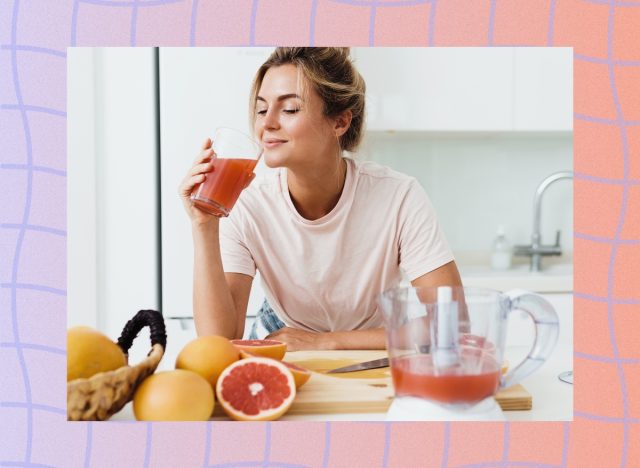
Carotenoids are compounds that give fruits and vegetables their natural coloring, and as we mentioned above, carrots contain a type of carotenoid that helps slow aging. Pink grapefruits also hold these compounds, but they have one that is called lycopene.
Lycopene, which is also found in tomatoes and watermelon, is known to have numerous health properties and has even been found to improve the appearance of your skin. Research published in Food Science & Nutrition found that lycopene had “rejuvenating” effects on the skin of middle-aged participants.
Another study published in the American Journal of Nutrition concluded that lycopene can both lower LDL cholesterol (the bad kind) and raise HDL cholesterol levels (the good kind), which are important factors in supporting heart health. Managing your cholesterol is especially crucial as you age, since heart disease is the number one cause of mortality in America. So, if you’re a grapefruit fan, try a glass of this juice to slow aging.
Wheatgrass juice
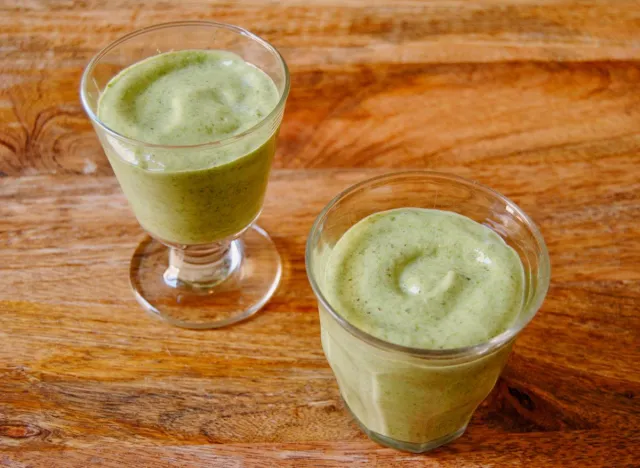
Let’s be honest, wheatgrass juice tastes pretty awful. But the health benefits and anti-aging properties are well worth the grassy flavors.
For one, wheatgrass contains vitamin C, vitamin E, and flavonoids—which are natural substances found in fruits and vegetables that may aid in disease risk reduction. Wheatgrass is also extremely high in chlorophyll, the compound that makes many plants green. When consumed, chlorophyll has been found to have antioxidant properties as well as chemoprotective abilities, which means it protects your body from the negative side effects of chemotherapy. This is because of its ability to reduce the bioavailability of carcinogens—or substances that can cause cancer—in your body.
A previous version of this story was published on February 10, 2022. It has been updated to include additional copy and proofreading revisions, additional research, and updated contextual links.
- Source: https://www.cdc.gov/nutrition/data-statistics/sugar-sweetened-beverages-intake.html
- Source: https://www.sciencedaily.com/releases/2016/07/160711120533.htm
- Source: https://www.nature.com/articles/s41430-021-00950-1
- Source: https://www.ncbi.nlm.nih.gov/pmc/articles/PMC6164534/
- Source: https://cebp.aacrjournals.org/content/13/2/260
- Source: https://www.sciencedirect.com/science/article/pii/S2213231721000811?via%3Dihub
- Source: https://health.clevelandclinic.org/the-health-benefits-of-beets/
- Source: https://www.nature.com/articles/jhh201634
- Source: https://www.ncbi.nlm.nih.gov/pmc/articles/PMC6475749/
- Source: https://academic.oup.com/ajcn/article/71/6/1691S/4729653
- Source: https://pubmed.ncbi.nlm.nih.gov/26156538/
- Source: https://www.ncbi.nlm.nih.gov/pmc/articles/PMC5465813/
- Source: https://www.ncbi.nlm.nih.gov/pmc/articles/PMC3486520/
